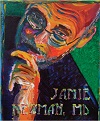The ID of Dorian Gray: A tale of medical horror
The picture showed a bright-eyed, earnest young healer.
The hallway was filled with a miasma of melena and metastasis and the cacophonic clacking of keyboards. The senior resident, Dr. Henry Wotton, sat in the corner staring at a computer screen and waiting for his new intern to arrive. He scanned the emergency department census, hoping to cherry-pick the most interesting or easiest admissions. He was considering whether to discharge a patient, balancing the risk of readmission with the impact on his census and workload. He was also thinking about leaving early so he could pursue his hedonistic hobbies. Suddenly the olfactory landscape changed and he caught the fresh smell of lilacs and mint.

His new intern, Dr. Dorian Gray, had arrived. Dr. Gray's lab coat was starched impossibly white and his shoes were brightly polished, but neither were as gleaming as his smile, which he flashed at his senior. Dr. Gray took his new resident's hand in his own and gave it a warm shake. He said that he was honored to meet Dr. Wotton and that he looked forward to taking care of patients and learning from him. Dr. Wotton mentally rolled his eyes at this impossibly young and altruistic intern. He wondered how long that might last.
As Dr. Gray leaned forward to shake hands, his ID card fell from his pocket. Dr. Wotton watched him pick it up off the floor and rub hand sanitizer on it before precisely hanging it on the breast pocket of his lab coat. The picture showed a bright-eyed, earnest young healer. Dr. Wotton recommended that he make a color copy of his ID card. Then he could carry his ID in his wallet for electronic entry and have numerous nonfunctional copies to wear. Dr. Gray expressed concern about this violation of policy, as he'd never been a rule breaker. However, he wiped off the card, copied it on the hospital's high-quality printer, and placed the copy in the plastic case attached to his coat. He shoved the original back in his wallet.
Dr. Wotton showed Dr. Gray a lot of tricks to improve efficiency. Many of them were legitimate, but some were most decidedly not. He taught him about the advanced art of copy and paste, how to “play” the admission board, and best of all, how to slip into conference, sign in, and exit, food in hand, without being seen. As their first month together went on, Dr. Gray began to enjoy these little “tricks of the trade.” He was out by 6:00, hours before any of his first-year cohorts. One night he made a few more fake IDs. He noticed that the original already seemed slightly smudged. He was glad he had made copies.
On Dr. Gray's third inpatient rotation, he was reunited with Dr. Wotton as the Med A team. They were sharing a unit with a sister service. Every third night they would get hammered with admissions, up to 16 each. But somehow post-call, Med B would have 22 patients, all either complex or with placement issues, and Med A would have 14 interesting and dischargeable cases.
Dr. Wotton was amazed at the changes in Dr. Gray. He was like a disciple who had surpassed the master. It wasn't only manipulating his work environment that amused him. He had liaisons, both platonic and otherwise, with many of the nurses, orderlies, housestaff, even attendings, without regard to the consequences. Dr. Wotton almost felt relieved when the month was over. It was too intense watching Dr. Gray do his thing, playing the system, shifting blame, taking unwarranted credit, while all the while his colleagues and the staff around him thought he was a reincarnation of William Osler. Dr. Wotton didn't want to be around if things went wrong.
As his intern year was coming to a close, Dr. Gray thought back on his actions over the last few months. He had been an idealistic young physician. He had changed entirely, but amazingly he still had a reputation as a caring and efficient intern. It was a source of endless amusement, he thought to himself as he hurried into the hospital. They were going to announce the annual awards, and Dr. Gray was sure he'd be named intern of the year. His old resident Dr. Wotton was on the committee and the fix was in.
But when Dr. Gray got to the security entrance, he realized he didn't have one of his fake IDs on his coat. He generally just walked in, and the guards all knew him and waved him through. However, Oscar Wilderstein was the guard that day, and he had recently discovered an affair between Dr. Gray and his wife, which had led to a nasty confrontation among the three of them. Wilderstein was not about to do a favor for the doctor who had ruined his home life.
Dorian Gray was in a hurry. He pulled his actual ID card from his wallet, which he hadn't done since that first day, and he held it up to the guard. Wilderstein scrutinized it closely and his face twisted in horror. He backed away slowly, waving Dr. Gray through.
Dr. Gray walked into the call room. He wondered what had made the guard act so strangely. He turned the ID card over and looked at the picture. He saw an aged, evil, egotistical face. He saw the face not of a healer but an abuser. But it was still him. He grabbed a pen and began to jab at the card, trying to cross out the horrible self-image. Finally, the pen went through the center.
Dr. Gray never showed up to receive his award. They went to look for him and found him lying on the call room floor, dead, a pen shoved through his throat.



